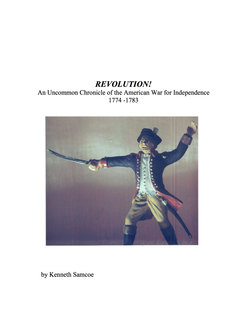Читать книгу Revolution An Uncommon Chronicle of the American War for Independence - Kenneth JD Samcoe - Страница 22
На сайте Литреса книга снята с продажи.
REBELS OCCUPY MONTREAL
ОглавлениеCarlton Flees Toward Quebec
The generals marched into the city just at evening. The citizens before their entrance proposed terms of capitulation, but the generals observed ... that the troops came not as enemies but as friends to protect them, and as they pretended to be afraid that the troops would plunder them,(the generals) assured them that they should ... be safe in their persons and estates.
Benjamin Trumbull, Chaplain
November 13, 1775
Montreal, Canada: Nov.13, 1775. British General Sir Guy Carlton narrowly escaped capture when rebel artillery shelled the Gaspe, a British ship that he was fleeing on, outside Montreal. Carlton had evacuated his garrison of 150 men at Montreal and he was sailing toward Quebec when rebel troops overtook his small fleet. The British general disguised himself as a local farmer and was rowed to shore shortly before rebel troops boarded the ship and took his men prisoner.
Rebel forces under General Montgomery now occupy nearly all formerly held British garrisons in Canada. They are reportedly pushing toward the heavily fortified town of Quebec, Britain’s most northern and only foothold in Canada. Since it is doubtful Montgomery’s force can maintain a winter siege of Quebec without additional troops and supplies, victory for the rebels will depend on their ability to capture Quebec before the winter sets in.
The indifference of local settlers has been puzzling and disappointing to both British and rebel camps. Neither adversary has had success in raising troops in Canada. Rebels acknowledge historic conflicts between Protestant majorities in the colonies and predominantly Catholic settlers in Canada have not helped their cause. General Carlton became a popular governor when he helped author the Quebec Act which, among other things, recognizes the Catholic Church.
The Quebec Act extends the northern and western boundaries of Canada which elates the Canadians and infuriates the colonists. Massachusetts, Connecticut and Virginia are expanding their own territories into what is now considered by Parliament to be Canadian land. The colonists feel betrayed because they fought alongside British troops to drive the French from their western and northern borders only to relinquish their territories to Carlton, the governor of Canada.
Anti-British feeling has been strong among the wealthy in Canada whose land was confiscated after the French and Indian War. The war also stripped Catholic priests of their almost unlimited political power. But neither the former landowners nor the Catholic priesthood has been quick to embrace the colonial invasion.
In related news, rebel command celebrated the capture of HMT Nancy, a British ordinance ship, commandeered by the American schooner U.S.S. Lee in the Boston harbor. The Nancy yielded 2,000 muskets, 100,000 flints, and 30,000 round shots, 31 ton of musket shot and a 13-inch, 2,700-pound brass mortar.
